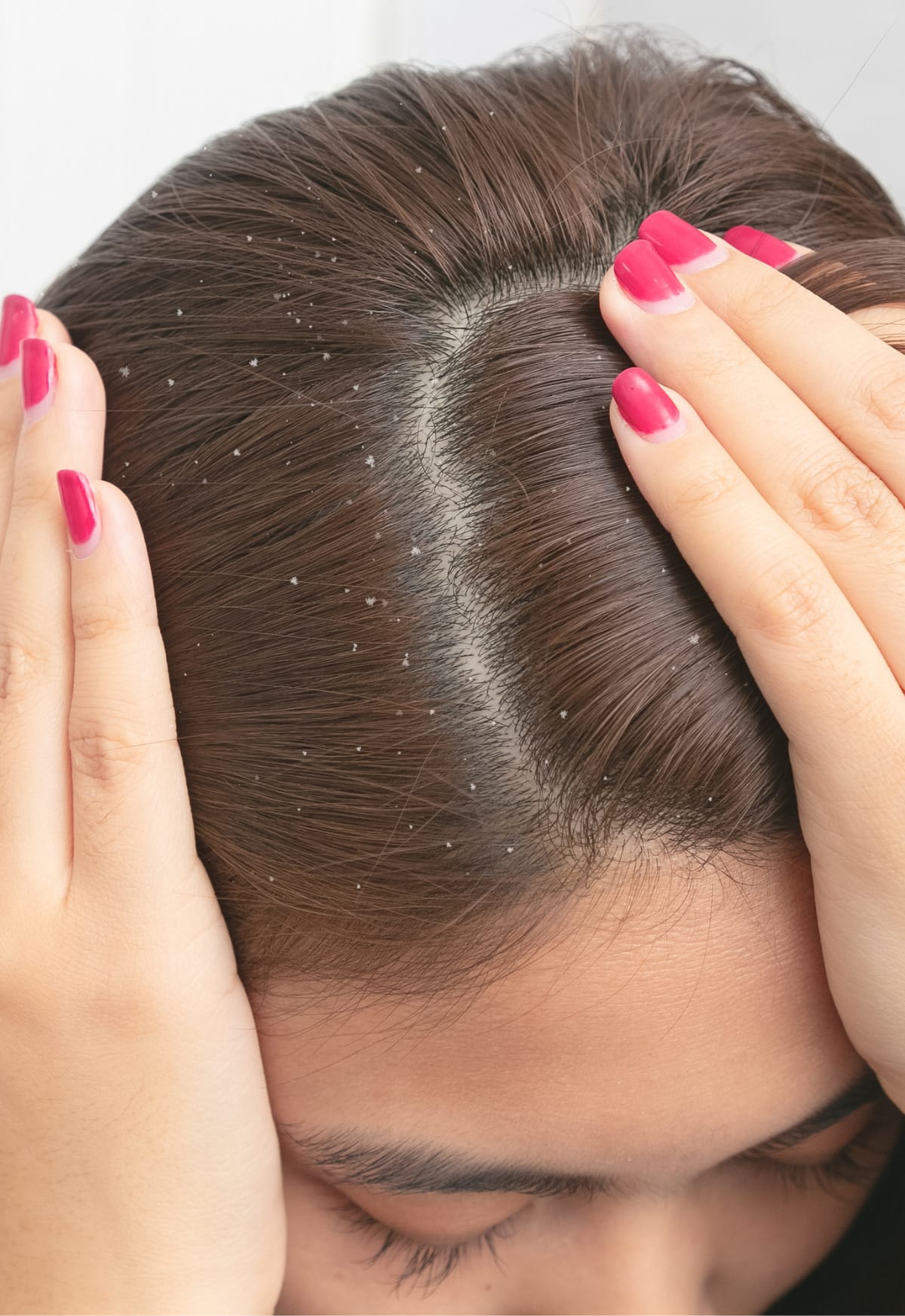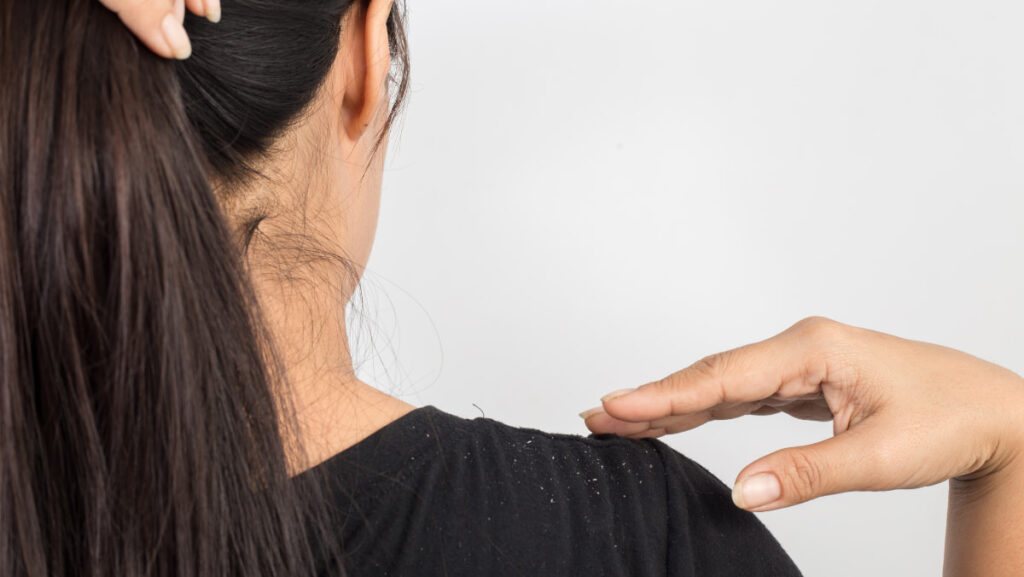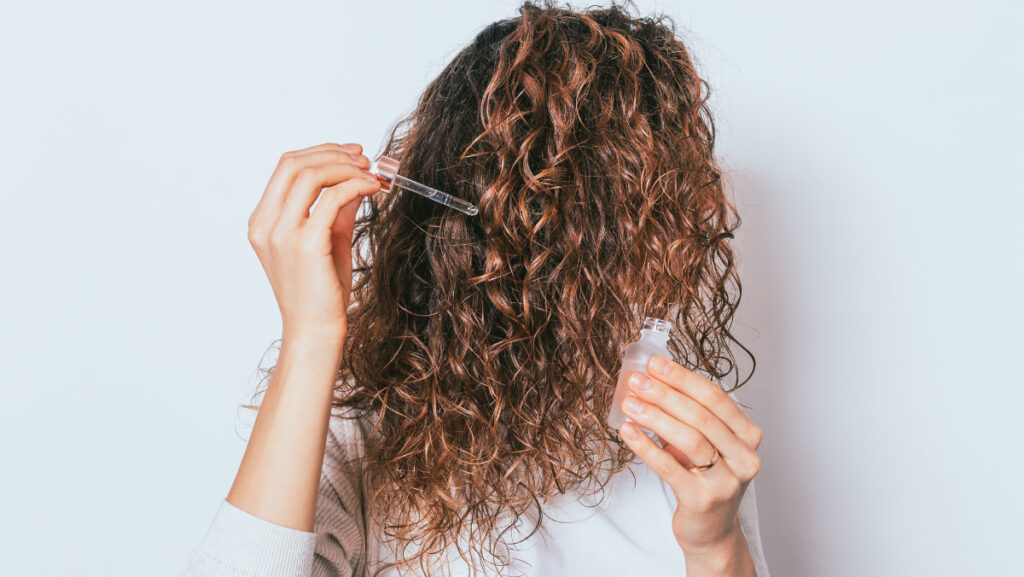
Is dandruff contagious? That’s a question you’ve probably found yourself pondering as you notice those tiny white flakes on your friend or family member’s shoulders.
It can certainly spark curiosity and concern, especially if you’re sharing personal items like combs or pillows.
Rest assured, we’ll dive right into the heart of this topic and offer a clear answer to your burning question.
Along the way, we’ll unpack what exactly dandruff is, its causes, and how it affects individuals. This will provide you with a well-rounded understanding of this common scalp condition.
It’s important to remember that while dandruff may seem embarrassing or uncomfortable to discuss, it’s quite a common issue among adults.
So, let’s address all these concerns one by one – starting off with whether dandruff is contagious or not.
Understanding Dandruff: What It Really Is
Dandruff, that pesky white stuff you find on your shoulders, isn’t as simple as you might think. It’s actually a common scalp condition caused by various factors like dry skin, sensitivity to hair products, and the presence of a particular yeast-like fungus called Malassezia. What, is Dandruff a fungus?!
Malassezia is naturally present on everyone’s scalp. But don’t worry! This doesn’t mean you’re destined for dandruff doom. Problems only arise when this fungus grows out of control.
There are several triggers that can cause this overgrowth:
- Dry or oily skin
- Weather changes (especially cold and dry winters)
- Hormonal imbalances
- Stress
- Poor diet
If these conditions prevail, the Malassezia fungus feeds off the oils on your scalp, causing skin cells to shed faster than usual. These extra cells clump together, forming those annoying white flakes we know as dandruff.
Understanding what causes dandruff is key to combating it effectively. However, it’s also crucial to debunk some myths about this common scalp condition – such as its contagious nature.
Contrary to popular belief, dandruff is not contagious. You cannot ‘catch’ it from someone else, nor can you pass it on to others by sharing personal items like combs or hats.

Is Dandruff Contagious: Debunking Myths
Let’s get straight to the point. You’re probably wondering, Is dandruff contagious? This common question stems from a misconception about what dandruff really is and how it forms.
Dandruff isn’t an infection that can be passed from person to person: Instead, it’s a scalp condition that results from the overproduction of skin cells. To be precise, everyone has a yeast-like fungus called Malassezia globosa on their scalp.
It feeds off sebum (the natural oils your scalp produces), and in some people, this process leads to irritation and increased cell turnover – causing those pesky white flakes we know as dandruff.
You might ask, then, why does it seem like someone gets dandruff after spending time with another individual who has it? The answer lies not in contagion but in shared environments or habits.
You may both be using a hair product that irritates your scalps or live in an area with hard water, which can exacerbate dandruff symptoms.
Now, let’s dispel another myth while we’re at it – just because you have dry skin doesn’t mean you’re more likely to get dandruff. In fact, oily scalps are more prone to this condition than dry ones! Here’s why:
- Oily Scalp: Overactive oil glands create an environment where Malassezia thrives.
- Dry Scalp: While flaking occurs due to lack of moisture, these flakes are usually smaller and less oily than those associated with true dandruff.
So remember: even though dealing with the unsightly white flakes may feel like a contagious plague sometimes – rest assured knowing that your situation isn’t infectious!
Finally, don’t hesitate to consult with a dermatologist if over-the-counter solutions aren’t cutting it; they’ll help guide you towards effective treatments suited for your unique needs.
Prevention and Treatment of Dandruff
Your scalp’s health matters, and protecting it from dandruff is a vital part of maintaining that wellness. So, how can you keep your scalp healthy and dandruff-free? Here are some tried-and-true tips:
- Keep it clean: Regular shampooing can help reduce oil and skin cell buildup, which could lead to dandruff. Use a gentle shampoo daily if you’re prone to an oily scalp.
- Try a specialized shampoo: If regular washing isn’t enough, consider using a medicated or anti-dandruff shampoo. These products contain ingredients like selenium sulfide or zinc pyrithione that target the specific causes of dandruff.
- Maintain a balanced diet. Believe it or not, what you eat can impact your scalp’s health! Consuming foods rich in omega-3 fatty acids, B vitamins, and zinc may help prevent dryness and flakiness.
When dealing with persistent dandruff despite your best efforts at prevention, it might be time for treatment options:
- Over-the-counter treatments: Many anti-dandruff shampoos available without a prescription effectively treat mild cases of the condition.
- Prescription treatments: For more severe cases of dandruff or if over-the-counter remedies aren’t working for you, consult with your healthcare provider about prescription options.
Finally, don’t forget that stress management plays an essential role in overall skin health! High-stress levels may exacerbate existing conditions like seborrheic dermatitis (a common cause of dandruff), so finding ways to relax could also benefit your scalp.
Remember, while anyone can get flaky from time to time—especially during cold months when indoor heating can contribute to dry skin—consistent flakes might be symptomatic of something else going on with your body’s largest organ: its skin!

Wrapping Up The Truth About Whether Dandruff Is Contagious
By now, you’re probably wondering what the final word is on dandruff. Is it contagious or not? Well, we’ve got your answers right here.
We said it before and will say it again: dandruff isn’t contagious. You can’t catch it from someone else or pass it on to another person.
It’s caused by an overgrowth of a yeast-like fungus called Malassezia that naturally lives on our scalps. Sometimes, this fungus grows out of control, leading to irritation and excessive skin cell growth.
Here are some quick facts:
- Dandruff isn’t a reflection of personal hygiene.
- It is most commonly seen in people between the ages of 20 and 30.
- Stress, weather changes, certain illnesses, and diet can trigger dandruff.
However, don’t confuse dandruff with lice. Lice are tiny insects that infest hair and scalp, causing itching, but unlike dandruff, they are highly contagious.
Now, let’s talk treatment. While there’s no absolute cure for dandruff, you can manage its symptoms effectively using medicated shampoos containing zinc pyrithione or selenium sulfide, among others. In severe cases, dermatologists may prescribe stronger treatments like corticosteroids.
Remember to consult with a healthcare professional if you’re experiencing persistent flaking and itching, as these could be signs of other underlying conditions, such as seborrheic dermatitis or psoriasis, which require different treatments than regular dandruff.
Frequently Asked Questions
How we reviewed this article
- Process
